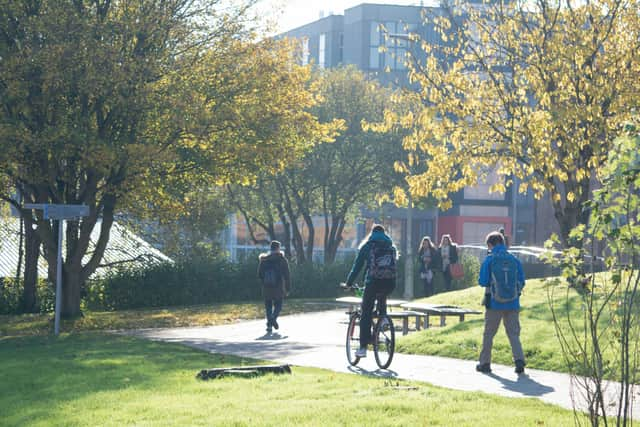‘Lack of clarity on duty of care’ - University of the West of England boss on student suicides
This article contains affiliate links. We may earn a small commission on items purchased through this article, but that does not affect our editorial judgement.
and live on Freeview channel 276
The University of the West of England has echoed calls on the government to define ‘duty of care’ and laid out its suicide prevention strategy after five students under the institution took their own life over the past five years.
BristolWorld is running a week-long focus on student suicide after figures obtained through a Freedom of Information Act request revealed that 19 students have tragically completed suicide in Bristol since 2018.
Advertisement
Hide AdAdvertisement
Hide AdAccording to the figures, the University of Bristol recorded 14 student suicides between 2018 and 2022, while the University of the West of England (UWE) recorded five.
BristolWorld spoke to both universities in order to understand the support being offered to students along with the challenges faced.


Simon Phillips, deputy director of student and academic services at UWE, agreed to an interview about the university’s approach, including training for members of staff through the ASIST course.
Simon has been working in higher education since 1998, mostly around developing provision for disabled students and wellbeing, so mental health is a topic he’s well-versed in despite its ever-changing landscape.
Advertisement
Hide AdAdvertisement
Hide AdHe said: “In the late 1990s, the discussion that was being had was about disability. The question was, are there disabled people within universities?
“Well, of course, there are. Thousands of people disclose a disability at UWE each year.
“But back then, universities were still getting their head around their policies and practices in relation to disability.
“The first part of my career was all about that, but the second part has seen a shift into wellbeing, mental health and mental illness.


Advertisement
Hide AdAdvertisement
Hide Ad“I’m talking abstractly, but I do feel that it’s going through the same process. The issue is now certainly being recognised as something universities need to have the right approach to.”
Defining ‘duty of care’
The issue of student suicide was recently propelled back into the spotlight following the case of Natasha Abrahart, who took her own life before she was due to give a presentation to her fellow students in 2018.
Natasha’s parents Robert and Margaret have spoken openly about their subsequent fight to ensure mental health support within universities is defined and regulated in order to prevent further deaths.
They told BristolWorld that their first port of call was urging the government to determine what ‘duty of care’ means, something that Simon is in agreement with.
Advertisement
Hide AdAdvertisement
Hide AdIn essence, universities have to ‘act reasonably to protect the health, safety and welfare’ of its students under duty of care, but even this notion isn’t always clear.
“I can’t imagine what Natasha’s parents are going through - I listened to an interview with Robert and I thought he made some very good points that I think were brave and helpful,” Simon added.
“Natasha’s dad said that we don’t necessarily need more counsellors. What we need is for processes and practices to be joined up so that universities can identify people who are at risk and exercise that duty of care. It’s important and really relevant to this whole discussion.
“When we think about where higher education is today, we’re all much more concerned about mental health in the last 10 to 15 years. We’re more aware of the difficulties not just for students, but across society.
Advertisement
Hide AdAdvertisement
Hide Ad“It’s just my viewpoint, but what I see is so many competing ideas in the field. There’s a lack of clarity about even what good mental health is.
“Expectations are different whether that be for politicians, parents, students or staff.
“What is the role of the NHS? What is the role of a university and what are the parameters we’re trying to set and exercise that duty of care within?
“It’s not clear yet, and that’s why I agree that duty of care being defined would really help.”
ASIST course
Advertisement
Hide AdAdvertisement
Hide AdIf a student presents with anxiety, depression or suicidal thoughts at UWE there are all the different ‘pathways’ you’d expect such as report and support, information points and wellbeing advisors.
Most staff, even if they’re not usually associated with student support such as cleaners and security guards, also undergo an ASIST (Applied Suicide Intervention Skills Training) course as part of their training.
The two-day course entails learning to ask a person you might feel concerned for a process of questions before leading up to asking if they feel they are at risk of hurting themselves or ending their lives by suicide.
“A large percentage, I think it’s around 75%, of people who sadly take their own lives didn’t tell anyone about how they were feeling prior to completing suicide,” said Simon.
Advertisement
Hide AdAdvertisement
Hide Ad“And although we create lots of pathways for students to find us, my worry is that universities will fail to identify people at risk if for whatever reason they choose not to speak up about what’s going on for them.


“When I initially brought in the ASIST course at UWE years ago, I think some staff were intimidated and very much like ‘hang on a minute, this is a big responsibiity’.
“But they quickly realised they’d had those conversations in the past where they thought, I’m worried about what that person just said, should I have taken it further?
“Not everyone talks to a professional. They might talk to the gardener or their gym instructor.
Advertisement
Hide AdAdvertisement
Hide Ad“If you find yourself in one of those conversations, ASIST allows you to ask the question so you can take the answer, whatever that might be, and do something with it.
“As much as it’s about service provision and sharing information with students, it’s also about culture and behaviour.
“At UWE we’d hope that no matter who you speak to as a member of staff, they’ll be able to make a response to that and pass it on.”
‘Slowly, the frameworks are being developed’
Simon is confident that positive change is afoot now that mental health is a priority for most in modern society.
Advertisement
Hide AdAdvertisement
Hide AdHe said: “We’ve got a wonderful, world-leading higher education sector in the UK, it’s one of our primary products.
“And I think across the two universities in Bristol a lot has happened to really respond and to support the idea of wellness and wellbeing over the last decade.
“Maybe this is the way change happens - over 10, 20, 30 years, an issue arises, there are different ideas put forward and then there’s time for putting some shape and some formality on that.”
Frameworks are slowly being developed said Simon, an example of which would be the Mental Health Charter created by Student Minds in 2019.
Advertisement
Hide AdAdvertisement
Hide AdBut he’d argue that there’s no one-size-fits all framework for all.
“Universities UK is a central body and does create guidance for universities, and the Office for Students has a governance aspect and imposes standards,” he added.
“At UWE there is a very positive and searching atmosphere to try and find answers to very difficult problems.
“But universities fulfil different purposes and are independent, competitive entities in some ways. Some are research-led, some are teaching universities like UWE.
Advertisement
Hide AdAdvertisement
Hide Ad“Universities will have different views on how to do these things and what works at UWE might not work somewhere else.
“You can’t impose rules on a certain way to solve issues because, frankly, does anyone know the way?
“As long as the commitment is there nationally across all institutions, there’ll be a lot of creativity, good ideas and good practice that develops going forward.”
Help is available for anyone affected by this issue. You can call the Samaritans for free on 116 123, email them at [email protected], or visit samaritans.org to find your nearest branch.
Papyrus offers support and advice to young people up to 35 years. Contact Papyrus HopelineUK on 0800 068 4141, text 07860 039967 or email [email protected].
Comment Guidelines
National World encourages reader discussion on our stories. User feedback, insights and back-and-forth exchanges add a rich layer of context to reporting. Please review our Community Guidelines before commenting.
